Unit 1 The world of our senses Grammar and usage(1) Introduction to noun clauses课件(37张)
文档属性
| 名称 | Unit 1 The world of our senses Grammar and usage(1) Introduction to noun clauses课件(37张) | 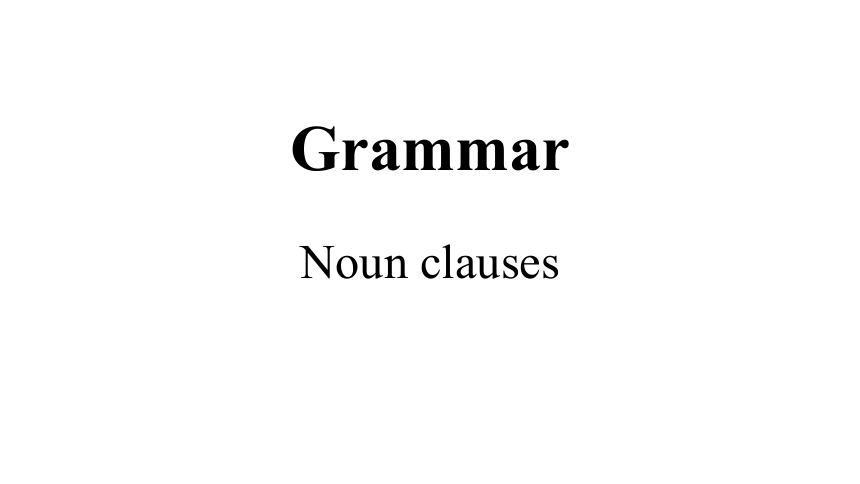 | |
| 格式 | zip | ||
| 文件大小 | 104.6KB | ||
| 资源类型 | 教案 | ||
| 版本资源 | 牛津译林版 | ||
| 科目 | 英语 | ||
| 更新时间 | 2019-07-23 08:56:52 | ||
图片预览

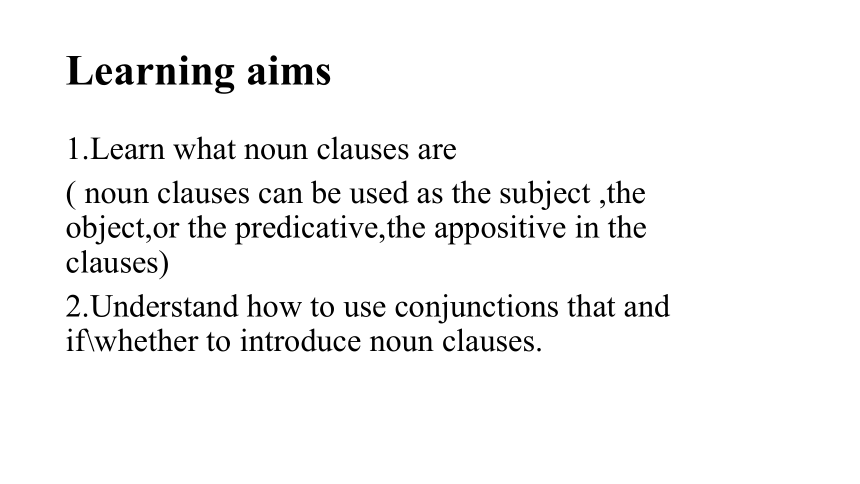
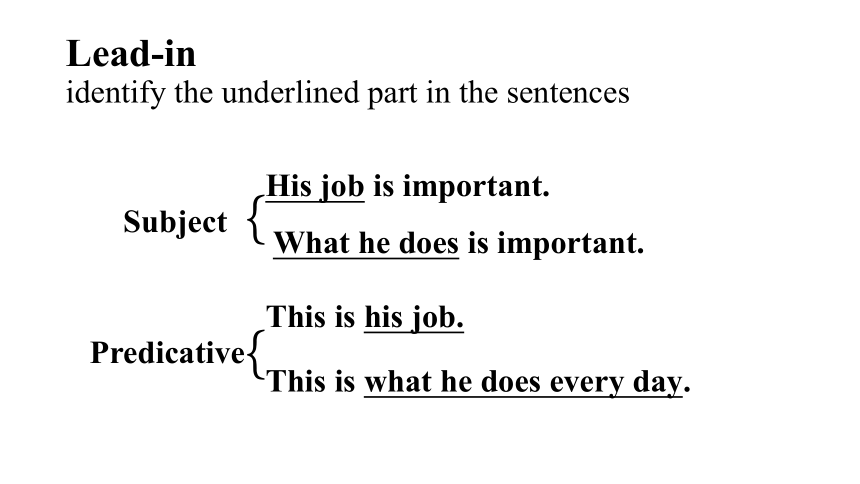
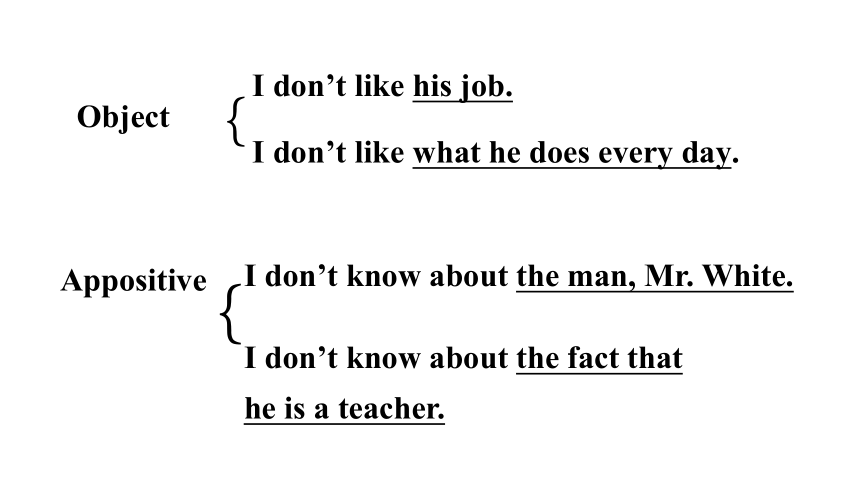
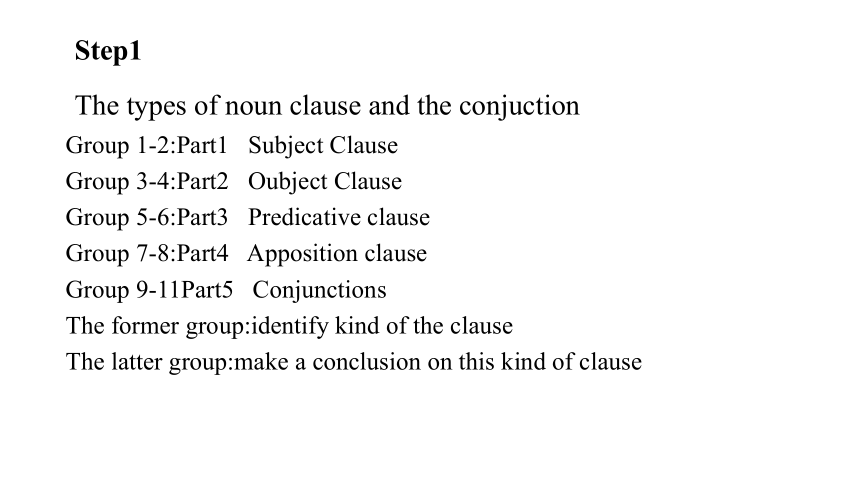
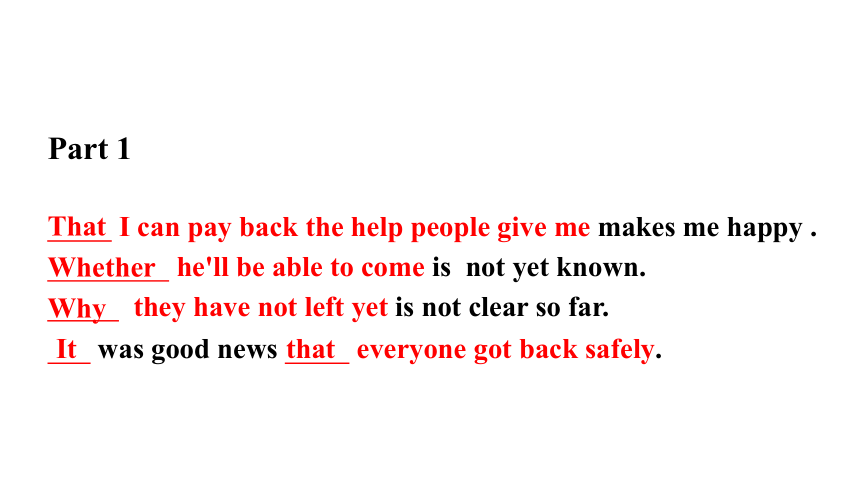
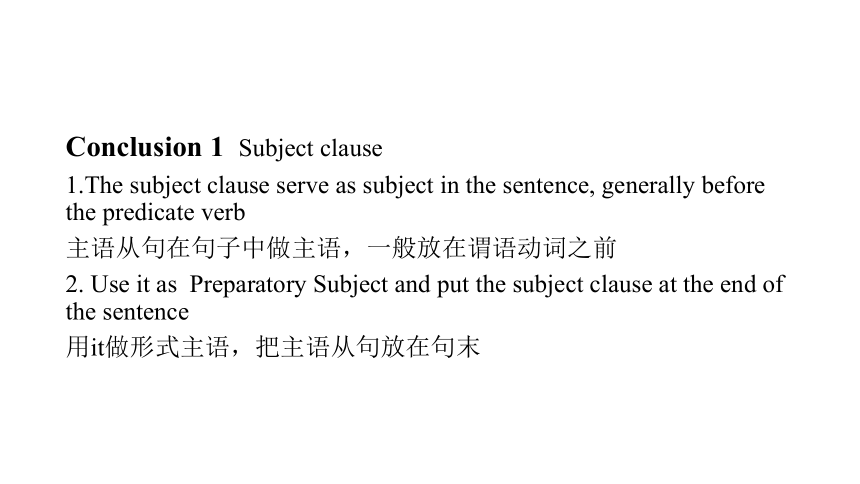
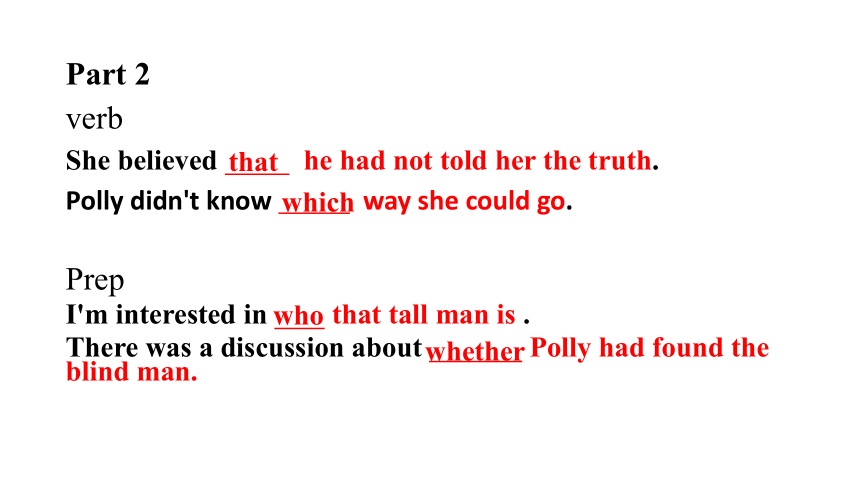
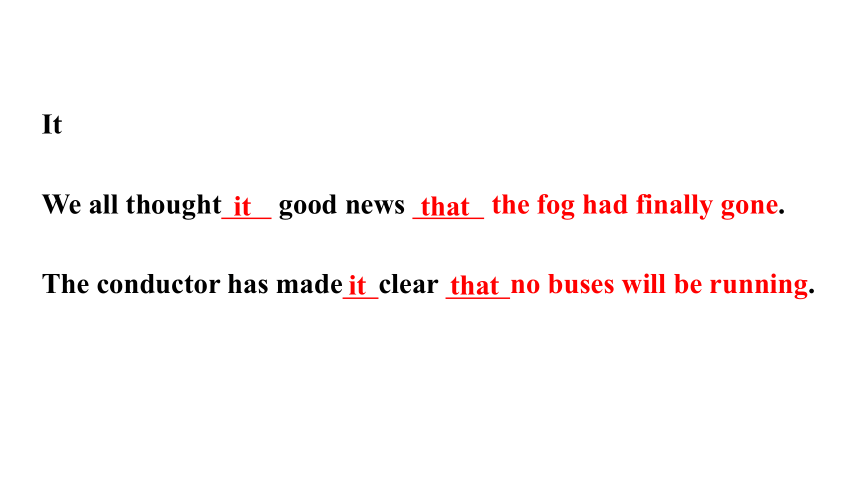
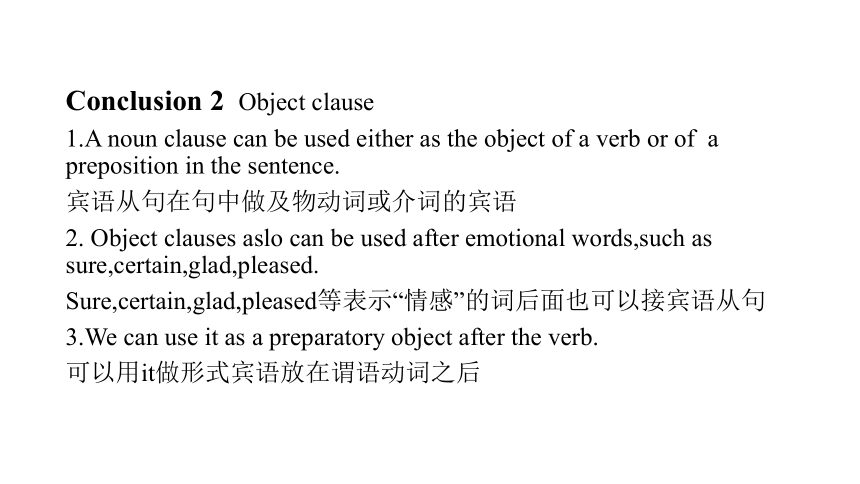
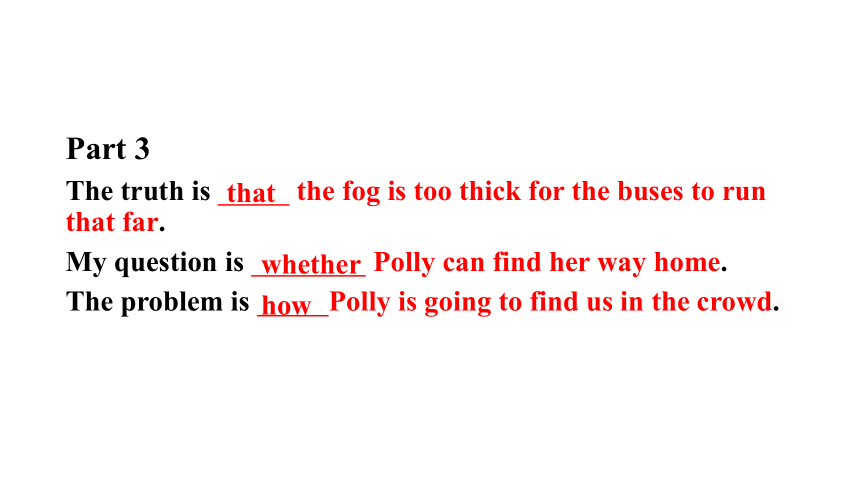
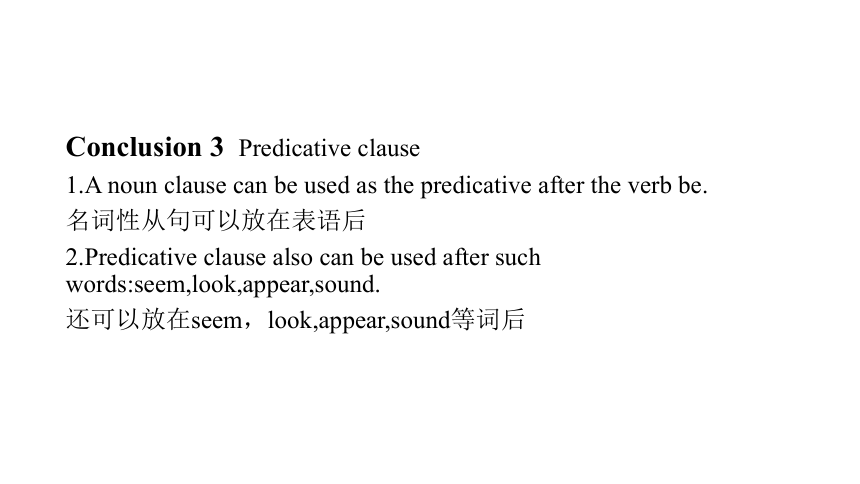
文档简介
课件37张PPT。Grammar Noun clausesLearning aims1.Learn what noun clauses are
( noun clauses can be used as the subject ,the object,or the predicative,the appositive in the clauses)
2.Understand how to use conjunctions that and ifwhether to introduce noun clauses.Lead-in identify the underlined part in the sentencesHis job is important.What he does is important.Subject This is his job.This is what he does every day.
Predicative{{I don’t like his job.I don’t like what he does every day.ObjectI don’t know about the man, Mr. White.I don’t know about the fact that he is a teacher.Appositive{{Group 1-2:Part1 Subject Clause
Group 3-4:Part2 Oubject Clause
Group 5-6:Part3 Predicative clause
Group 7-8:Part4 Apposition clause
Group 9-11Part5 Conjunctions
The former group:identify kind of the clause
The latter group:make a conclusion on this kind of clause
Step1
The types of noun clause and the conjuctionPart 1
I can pay back the help people give me makes me happy .
he'll be able to come is not yet known.
they have not left yet is not clear so far.
ThatWhetherWhy was good news everyone got back safely.ItthatConclusion 1 Subject clause
1.The subject clause serve as subject in the sentence, generally before the predicate verb
主语从句在句子中做主语,一般放在谓语动词之前
2. Use it as Preparatory Subject and put the subject clause at the end of the sentence
用it做形式主语,把主语从句放在句末Part 2
verb
She believed he had not told her the truth.
Polly didn't know way she could go.thatPrep
I'm interested in that tall man is .
There was a discussion about Polly had found the blind man.whichwhowhetherIt
We all thought good news the fog had finally gone.
The conductor has made clear no buses will be running.itthatitthatConclusion 2 Object clause
1.A noun clause can be used either as the object of a verb or of a preposition in the sentence.
宾语从句在句中做及物动词或介词的宾语
2. Object clauses aslo can be used after emotional words,such as sure,certain,glad,pleased.
Sure,certain,glad,pleased等表示“情感”的词后面也可以接宾语从句
3.We can use it as a preparatory object after the verb.
可以用it做形式宾语放在谓语动词之后Part 3
The truth is the fog is too thick for the buses to run that far.
My question is Polly can find her way home.
The problem is Polly is going to find us in the crowd.
thatwhetherhowConclusion 3 Predicative clause
1.A noun clause can be used as the predicative after the verb be.
名词性从句可以放在表语后
2.Predicative clause also can be used after such words:seem,look,appear,sound.
还可以放在seem,look,appear,sound等词后Part 4
She had a feeling she was being watched.
The news he couldn't come made us upset.
Whatever gave you the idea I can sing.thatthatthatConclusion 4 Apposition clause
1.The noun with an appositive clause is usually an abstract noun,such as news,fact,idea,truth or theory.
2.If we have an abstract nun with some definite information,an appositive clause can strengthen it.Part 5
I hope Polly will be ok.
No one knew he lost his sight because of an accident.
She couldn't imagine the blind man had found her.
thatif/whetherhowConclusion 5 -conjuction conjunction :无意义2. conjunction pronoun :3.conjunction adverb:“是否”作主/宾/表作状语that、if、whetherwho、 whom 、whose、what、whichwhen、 where、why、howExercise 1 Distinguish an appositive from an attributive clause
The fact that Polly told us is true.
The fact that Polly didn't ask for the man's name is a pity.1.The clause in the first stence in each pair is an attributive clause.
The noun fact,modified by the attributive clauses.
2.The clause in the senond sentence in each pair is an appositive clause,which gives detailed information about the noun.Part1:The right rows
Patr2:The middle rows
Part3:The left rowsStep2 The usage of that,whetherif and omission
The radio announced the mist would become a thick fog.
a man came to show her the way made her home.
It was really bad news we couldn't find our way out.
She wished someone would come along to help her.
The truth is the buses will not be running.thatThatthatthat\that\Part1 Conclusion 1--The usage of that
1.When a noun clause is a statement,that is used to introduce the clause.
2.That is cannot be omitted when it is used to introduced the subject clause.
3.That is never used after a preposition except after “in or except”.When used after in or except,that cannot be omitted.Another way to say the sentence in the example is:It was really...that...
4.When that is used to introduce an object or a predicative clause,it can be omitted in informal English.Part2
She wondered the buses would still be running.
She is not certain about she has done anything wrong.
it is going to clear up keeps me wondering.
I want to know or not the train goes to King Street.
ifwhetherwhetherWhetherwhetherConclusion 2--The usage of ifwhether
1.Ifwhether can be used to introduce a noun clause when the clause is a yesno question.The word order of the question in the clause should be changed in to that of a statement.
2.We can only use whether,but not if ,after a preposition,to introduce a subject clause,and with or not.
Part3 He said he liked rain very much and he wouldn't use an umbrella when it was raining.
No one knows it will be fin etomorrow and he will come to work.that\thatwhetherwhetherConclusion 3--Omission
1.If one verb has two noun clauses as its objects first “that”can be omitted,the second one can not be.
2.We can only use whether,but not if ,after a preposition,to introduce a subject clause,predicative clause,and with or not.
Exercise 2 1.---I think it is going to be a big problem.
---Yes, it could be.
---I wonder ______we can do about it.
A.if B.how C.what D.that
2.______is no possibility _____Bob can win the first prize in the match.
A.There; that B.It; what
C.There; whether D.It; whether3.A computer can only do ____you have instructed it to do.
A.how B.after C.what D.when
4.Can you tell me ______?
A.who is that gentleman
B.that gentleman is who
C.who that gentleman is
D.whom is that gentleman5.He didn’t know which room______.
A.they lived B.they lived in
C.did they live D.did they live in
6.To get the job started, ____I need is from here.
A.only what B.all what
C.all that D.only that
7.In some countries ________is called “equality” doesn’t really mean equal rights for all people.
A.which B.what C.that D.one
8.Go and get your coat. It’s ____you left it.
A.there B.where
C.there where D.where there9.______you don’t like him is none of my business.
A.What B.who C.That D.Whether
10.The reason____I plan to go is ___she will be disappointed ____I don’t .
A.why; because; when B.why; that; if
C.because; that; if D.why; that; whether11.---____can I do with a situation?
---Take____measure you consider best.
How ; whichever B.What; whatever
C. How ;whatever D.What; whichever
12._____she said suggested that she hadn’t decided ____to go or not.
A.What; if B.That; whether
C.What; whether D. Whether; what13.He made a promise _____anyone set him free he would make him very rich.
A.that B.if C.what D.that if
14.______would like to devote his whole life to his country should go _____there are all kinds of difficulties.
A.Who;somewhere B.Whoever; where
C.Whatever; anywhere D.Who; there15.---Can I sit in the front row?
---Yes. You can take ____seat you like.
A.whatever B.what
C.whichever D.which
16.They lost their way in the forest and ____made matters worse was ____night began to fall.
A.what; that B.it; that
C.what; when D.which; what17.____gone is gone. _____no use talking about it any more.
A.That’s; It’s B.What’s ; It’s
C.It’s; That’s D.That’s; that’s
18.I didn’t quite follow you . What was ___you just said about the place?
A.where B.which
C.that D.how19.It was ____my father worked ___I work now.
A.where; that B.wherever; where
C.that; where D.that; that
20.It was only____I reread his poems recently ______I began to appreciate their beauty.
A.that; when B.when; that
C.until; than D.when;thanStep3 Reflection
( noun clauses can be used as the subject ,the object,or the predicative,the appositive in the clauses)
2.Understand how to use conjunctions that and ifwhether to introduce noun clauses.Lead-in identify the underlined part in the sentencesHis job is important.What he does is important.Subject This is his job.This is what he does every day.
Predicative{{I don’t like his job.I don’t like what he does every day.ObjectI don’t know about the man, Mr. White.I don’t know about the fact that he is a teacher.Appositive{{Group 1-2:Part1 Subject Clause
Group 3-4:Part2 Oubject Clause
Group 5-6:Part3 Predicative clause
Group 7-8:Part4 Apposition clause
Group 9-11Part5 Conjunctions
The former group:identify kind of the clause
The latter group:make a conclusion on this kind of clause
Step1
The types of noun clause and the conjuctionPart 1
I can pay back the help people give me makes me happy .
he'll be able to come is not yet known.
they have not left yet is not clear so far.
ThatWhetherWhy was good news everyone got back safely.ItthatConclusion 1 Subject clause
1.The subject clause serve as subject in the sentence, generally before the predicate verb
主语从句在句子中做主语,一般放在谓语动词之前
2. Use it as Preparatory Subject and put the subject clause at the end of the sentence
用it做形式主语,把主语从句放在句末Part 2
verb
She believed he had not told her the truth.
Polly didn't know way she could go.thatPrep
I'm interested in that tall man is .
There was a discussion about Polly had found the blind man.whichwhowhetherIt
We all thought good news the fog had finally gone.
The conductor has made clear no buses will be running.itthatitthatConclusion 2 Object clause
1.A noun clause can be used either as the object of a verb or of a preposition in the sentence.
宾语从句在句中做及物动词或介词的宾语
2. Object clauses aslo can be used after emotional words,such as sure,certain,glad,pleased.
Sure,certain,glad,pleased等表示“情感”的词后面也可以接宾语从句
3.We can use it as a preparatory object after the verb.
可以用it做形式宾语放在谓语动词之后Part 3
The truth is the fog is too thick for the buses to run that far.
My question is Polly can find her way home.
The problem is Polly is going to find us in the crowd.
thatwhetherhowConclusion 3 Predicative clause
1.A noun clause can be used as the predicative after the verb be.
名词性从句可以放在表语后
2.Predicative clause also can be used after such words:seem,look,appear,sound.
还可以放在seem,look,appear,sound等词后Part 4
She had a feeling she was being watched.
The news he couldn't come made us upset.
Whatever gave you the idea I can sing.thatthatthatConclusion 4 Apposition clause
1.The noun with an appositive clause is usually an abstract noun,such as news,fact,idea,truth or theory.
2.If we have an abstract nun with some definite information,an appositive clause can strengthen it.Part 5
I hope Polly will be ok.
No one knew he lost his sight because of an accident.
She couldn't imagine the blind man had found her.
thatif/whetherhowConclusion 5 -conjuction conjunction :无意义2. conjunction pronoun :3.conjunction adverb:“是否”作主/宾/表作状语that、if、whetherwho、 whom 、whose、what、whichwhen、 where、why、howExercise 1 Distinguish an appositive from an attributive clause
The fact that Polly told us is true.
The fact that Polly didn't ask for the man's name is a pity.1.The clause in the first stence in each pair is an attributive clause.
The noun fact,modified by the attributive clauses.
2.The clause in the senond sentence in each pair is an appositive clause,which gives detailed information about the noun.Part1:The right rows
Patr2:The middle rows
Part3:The left rowsStep2 The usage of that,whetherif and omission
The radio announced the mist would become a thick fog.
a man came to show her the way made her home.
It was really bad news we couldn't find our way out.
She wished someone would come along to help her.
The truth is the buses will not be running.thatThatthatthat\that\Part1 Conclusion 1--The usage of that
1.When a noun clause is a statement,that is used to introduce the clause.
2.That is cannot be omitted when it is used to introduced the subject clause.
3.That is never used after a preposition except after “in or except”.When used after in or except,that cannot be omitted.Another way to say the sentence in the example is:It was really...that...
4.When that is used to introduce an object or a predicative clause,it can be omitted in informal English.Part2
She wondered the buses would still be running.
She is not certain about she has done anything wrong.
it is going to clear up keeps me wondering.
I want to know or not the train goes to King Street.
ifwhetherwhetherWhetherwhetherConclusion 2--The usage of ifwhether
1.Ifwhether can be used to introduce a noun clause when the clause is a yesno question.The word order of the question in the clause should be changed in to that of a statement.
2.We can only use whether,but not if ,after a preposition,to introduce a subject clause,and with or not.
Part3 He said he liked rain very much and he wouldn't use an umbrella when it was raining.
No one knows it will be fin etomorrow and he will come to work.that\thatwhetherwhetherConclusion 3--Omission
1.If one verb has two noun clauses as its objects first “that”can be omitted,the second one can not be.
2.We can only use whether,but not if ,after a preposition,to introduce a subject clause,predicative clause,and with or not.
Exercise 2 1.---I think it is going to be a big problem.
---Yes, it could be.
---I wonder ______we can do about it.
A.if B.how C.what D.that
2.______is no possibility _____Bob can win the first prize in the match.
A.There; that B.It; what
C.There; whether D.It; whether3.A computer can only do ____you have instructed it to do.
A.how B.after C.what D.when
4.Can you tell me ______?
A.who is that gentleman
B.that gentleman is who
C.who that gentleman is
D.whom is that gentleman5.He didn’t know which room______.
A.they lived B.they lived in
C.did they live D.did they live in
6.To get the job started, ____I need is from here.
A.only what B.all what
C.all that D.only that
7.In some countries ________is called “equality” doesn’t really mean equal rights for all people.
A.which B.what C.that D.one
8.Go and get your coat. It’s ____you left it.
A.there B.where
C.there where D.where there9.______you don’t like him is none of my business.
A.What B.who C.That D.Whether
10.The reason____I plan to go is ___she will be disappointed ____I don’t .
A.why; because; when B.why; that; if
C.because; that; if D.why; that; whether11.---____can I do with a situation?
---Take____measure you consider best.
How ; whichever B.What; whatever
C. How ;whatever D.What; whichever
12._____she said suggested that she hadn’t decided ____to go or not.
A.What; if B.That; whether
C.What; whether D. Whether; what13.He made a promise _____anyone set him free he would make him very rich.
A.that B.if C.what D.that if
14.______would like to devote his whole life to his country should go _____there are all kinds of difficulties.
A.Who;somewhere B.Whoever; where
C.Whatever; anywhere D.Who; there15.---Can I sit in the front row?
---Yes. You can take ____seat you like.
A.whatever B.what
C.whichever D.which
16.They lost their way in the forest and ____made matters worse was ____night began to fall.
A.what; that B.it; that
C.what; when D.which; what17.____gone is gone. _____no use talking about it any more.
A.That’s; It’s B.What’s ; It’s
C.It’s; That’s D.That’s; that’s
18.I didn’t quite follow you . What was ___you just said about the place?
A.where B.which
C.that D.how19.It was ____my father worked ___I work now.
A.where; that B.wherever; where
C.that; where D.that; that
20.It was only____I reread his poems recently ______I began to appreciate their beauty.
A.that; when B.when; that
C.until; than D.when;thanStep3 Reflection
